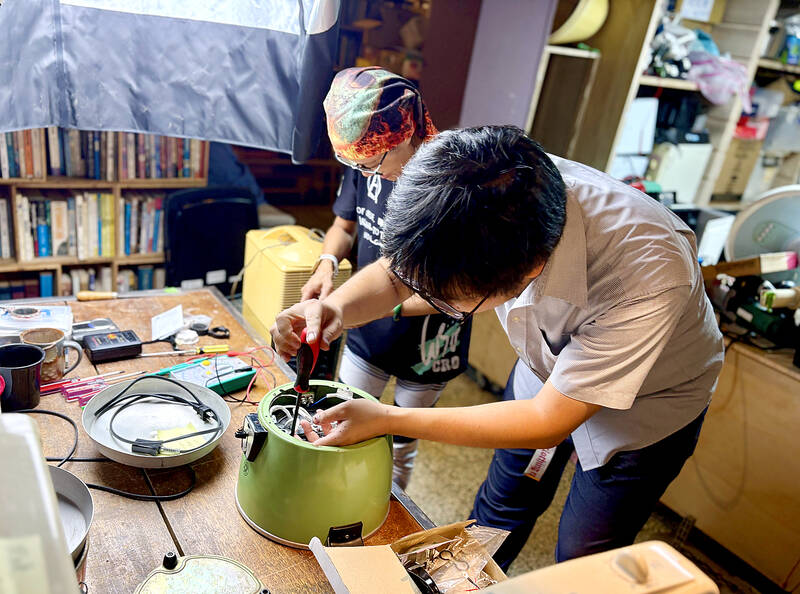Electric fans, rice cookers and hair dryers are the most often repaired small appliances, Circular Taiwan Network campaigner and Nanji Fix cofounder Yahsuan Tsai (蔡亞軒) said ahead of International Repair Day on Saturday next week.
International Repair Day falls on the third Saturday of October every year and the Ministry of Environment has commissioned the Institute of Environment and Resources to promote repair culture in collaboration with at least 33 repair communities nationwide.
Institute chairman and Deputy Minister of Environment Yeh Jiunn-horng (葉俊宏) last week said that repairing is the easiest and most economical way to reduce waste and carbon emissions.

Photo: Hunag Yi-ching, Taipei Times
Taiwan has taken part in the worldwide right-to-repair movement since 2022, he said.
The ministry organized 58 repair training sessions and 817 repair service sites have been established nationwide over the past two years, Yeh said, adding that people could visit the ministry’s national repair map (https://recycle.moenv.gov.tw/utmap/) to find the service sites.
Resource Circulation Administration Deputy Director-General Hsu Chih-lun (許智倫) said that green design and extended usage have been incorporated into the Resource Circulation Promotion Act (資源循環推動法).
The goal is to boost the durability and repairability of products by standardizing their parts and components, and making repair essentials easily accessible, he said.
Tsai encouraged people to cultivate basic repair capabilities, as many small household appliances could easily be fixed without advanced techniques.
For example, about 30 percent of seemingly broken electric fans only needed lubricant oil sprays or a new fuse, which cost less than NT$50, he said, adding that store repairs for small appliances cost hundreds of New Taiwan dollars.
The awareness of “repairing instead of replacing” should be raised and more repair sites should be set up nationwide given the massive repair demand, Tsai said.
Ensuring the right to repair by making products repairable with proper guidelines and reasonable costs is also important, Tsai added.
The government should promote easy-to-repair product designs jointly with manufacturers to extend product lifetimes by making their components easier to disassemble, maintain and replace, he said.
Nanji Fix research showed that of the small appliances brought to repair communities in Taipei, Hsinchu, Tainan, Kaohsiung and Changhua County from 2016 to this year, electric fans were the most common item that needed repairs, Tsai said.
Rice cookers were the second-most frequently repaired items, followed by hair dryers, CD players or radios, electric kettles or pots, lamps, microwaves, ovens or food dehydrators, juicers or blenders and toys, he said.
The ministry is to hold an event in collaboration with repair groups at Imma in Taipei’s Wanhua District (萬華) on Saturday and Sunday next week, where repair services for small appliances, shoes, clothing, bicycles, toys and other objects would be offered. Hands-on activities would also be held.
The first 500 participants who bring an object for repair could take home up to 600ml of laundry detergent for free, using their own container.

The manufacture of the remaining 28 M1A2T Abrams tanks Taiwan purchased from the US has recently been completed, and they are expected to be delivered within the next one to two months, a source said yesterday. The Ministry of National Defense is arranging cargo ships to transport the tanks to Taiwan as soon as possible, said the source, who is familiar with the matter. The estimated arrival time ranges from late this month to early next month, the source said. The 28 Abrams tanks make up the third and final batch of a total of 108 tanks, valued at about NT$40.5 billion

Two Taiwanese prosecutors were questioned by Chinese security personnel at their hotel during a trip to China’s Henan Province this month, the Mainland Affairs Council (MAC) said yesterday. The officers had personal information on the prosecutors, including “when they were assigned to their posts, their work locations and job titles,” MAC Deputy Minister and spokesman Liang Wen-chieh (梁文傑) said. On top of asking about their agencies and positions, the officers also questioned the prosecutors about the Cross-Strait Joint Crime-Fighting and Judicial Mutual Assistance Agreement, a pact that serves as the framework for Taiwan-China cooperation on combating crime and providing judicial assistance, Liang

A group from the Taiwanese Designers in Australia association yesterday represented Taiwan at the Midsumma Pride March in Melbourne. The march, held in the St. Kilda suburb, is the city’s largest LGBTQIA+ parade and the flagship event of the annual Midsumma Festival. It attracted more than 45,000 spectators who supported the 400 groups and 10,000 marchers that participated this year, the association said. Taiwanese Designers said they organized a team to march for Taiwan this year, joining politicians, government agencies, professionals and community organizations in showing support for LGBTQIA+ people and diverse communities. As the first country in Asia to legalize same-sex

MOTIVES QUESTIONED The PLA considers Xi’s policies toward Taiwan to be driven by personal considerations rather than military assessment, the Epoch Times reports Chinese President Xi Jinping’s (習近平) latest purge of the Chinese People’s Liberation Army (PLA) leadership might have been prompted by the military’s opposition to plans of invading Taiwan, the Epoch Times said. The Chinese military opposes waging war against Taiwan by a large consensus, putting it at odds with Xi’s vision, the Falun Gong-affiliated daily said in a report on Thursday, citing anonymous sources with insight into the PLA’s inner workings. The opposition is not the opinion of a few generals, but a widely shared view among the PLA cadre, the Epoch Times cited them as saying. “Chinese forces know full well that